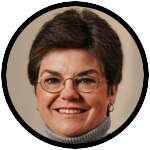
Effie Caldarola
On a recent Sunday, I delivered fresh produce to the Syrian refugee family my Catholic community sponsored this year.
As I parked outside the apartment building, eager little faces were watching for me from the second-floor window, and soon the three oldest children of the family dashed from the door below to help.
I shuffled some of the store-discarded apples, lettuce and other reclaimed goodies into lighter bags for them to carry, and I juggled the large box until the dad of the family met me on the stairs to take it.
It is always a joy to visit this family. Their smiles are contagious and their gratitude is touching. Although their English is extremely limited, it is easy to understand the language of warmth in the mom’s robust hugs and her incredible baklava, a pastry I find impossible to resist.
[hotblock]
How do you say “I’m on a diet” in Arabic? You don’t, you just savor this treat, an ample serving delivered with enthusiasm.
During the past year, the state of Nebraska, where I live, resettled more refugees per capita than any state in the nation. Catholic Charities in the Diocese of Lincoln is a resettlement agency. Lutheran Family Services is the largest in the state, resettling people from 12 countries last year, many from Myanmar and Bhutan.
Among the 1,441 refugees Nebraska accepted from October 2015 to September 2016 were 118 Syrians.
To say our group “sponsored” a family means we furnished and equipped their three-bedroom apartment and filled their kitchen with utensils, dishes and food.
We met them at the airport when they arrived in the spring, and some from our group have continued to visit them weekly. They’ve been taken to our world-class zoo, been equipped with winter clothes and helped with school paperwork.
On the Sunday I visited, they accompanied some of us to a rally in support of refugees, held in the aftermath of President Donald Trump’s order temporarily banning refugees and others from our country.
The 1,800 people who gathered on a chilly, cloudy Sunday sported signs indicating Omaha is a welcoming place. The youngest child of our refugee family admired the sign of another youngster in our group: “Jesus was a refugee,” it said. Of course, she couldn’t read it, but it was a good sign to admire anyway, whether you’re Muslim or Christian.
The dad of this family couldn’t attend the rally, as he was off to work that afternoon. He holds down two jobs, neither in the technical field he hopes to re-enter when his English is proficient. He works seven days a week to support his family.
[hotblock2]
There are some things that people, even at the highest levels of our government, seem to misunderstand about refugees. To become accepted as a refugee, you are vetted extensively — “extremely” — for years.
Our family, after fleeing from Aleppo before its destruction, spent two years in a Turkish refugee camp. There, they were repeatedly interviewed, examined, investigated.
No one disputes that our country has a moral obligation to keep its citizens safe and its borders secure. But experts are nearly unanimous in their opinion that the ban on refugees, and on the millions of citizens of seven majority-Muslim nations, makes us less safe.
And no one should dispute that we also have a moral obligation to do what we can for the suffering and war-weary of this world.
Cardinal Blase J. Cupich of Chicago spoke for U.S. Catholics when he said President Trump’s executive order was “a dark moment in U.S. history” and that it was “contrary to both Catholic and American values.”
PREVIOUS: What President Trump could learn from George Washington’s farewell
NEXT: Cupid vs. Christ: What love looks like, and what it truly is



Share this story